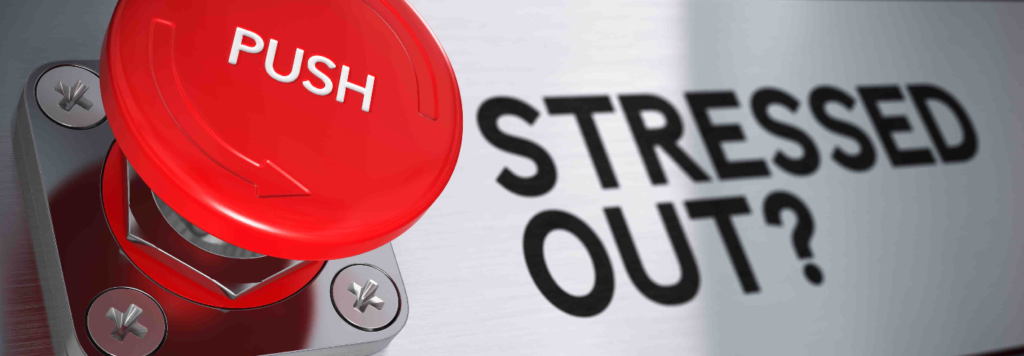Studying for the EPPP can be a stressful and overwhelming undertaking. Stress can be a normal part of the EPPP preparation process, therefore we must learn to manage it. But, what happens when it becomes more than stress and studying begins to affect your mental health?
In order to address the effect of studying on your mental health, you must first know the warning signs. Here are three signs that your mental health is being affected by studying.
- Panic Attack
A panic attack is characterized by any number of the following symptoms: shortness of breath, racing heart, dizziness, the sense that you’ve lost control, feeling faint, or a sense of terror.
If you do experience a panic attack, don’t try to fight it off. Instead, breathe deeply, engage yourself in your surroundings and allow the panic to subside.
- Forgetfulness
A surprising symptom of anxiety is forgetfulness. Because anxiety is overwhelming and consuming, it can cause you to forget things such as what you highlighted in last night’s study session. Furthermore, a hormone called cortisol is released when we experience stress. Cortisol is known for preventing the formation of memories.
- Depression
Symptoms of depression include feelings of sadness, disinterest in activities you once enjoyed, lack of energy, and anxiety. Experiencing depression during EPPP preparation can affect your motivation to study as well as your ability to maintain a healthy balance between studying and time with family and friends.
If you experience any, or a combination, of the above, then the stress of taking the EPPP is affecting your mental health. This means it is time to take a step back and get help. Talk to a trusted friend and seek professional help. A counselor can advise you on how to move forward through depression and anxiety.
If you don’t identify with the above symptoms, maintaining good mental health is key. Here are 3 ways to stay mentally healthy during EPPP prep.
- Know the warning signs of stress and burnout
Everyone reacts to stress differently, but here are a few possible warning signs of stress per The American Psychological Association (APA): Headaches, muscle tension, neck or back pain; Upset stomach; Dry mouth; Chest pains and rapid heartbeat; Difficulty falling or staying asleep; Fatigue.
Furthermore, if you feel like you have nothing left to give, you may be experiencing burnout.
Look at stress relief strategies here.
- Schedule breaks
When you create your study schedule, be sure to include breaks. During periods of rest, our brains store and organize the material we have learned. So, not only are breaks giving you rest to combat anxiety, but they are helping your memory and retention.
Your breaks should include small 5-10 minute breaks as well as longer 30 minute ones. Be sure to incorporate a good night’s sleep as well.
- Gratitude
Thinking thankful thoughts can literally detox your brain. Thinking negatively creates toxins in your brain that can be combatted by shifting your thinking to positivity. By cultivating a positive, gratuitous attitude, you can starve your inclination to think negatively.
Not only will gratitude detox your brain and make you happier in general, but it will reduce stress and anxiety, ultimately making you mentally healthier.
References
Dunn, Carrie. “Mind over Matter: The Effects of Studying on Mental Health.” The Guardian, Guardian News and Media, 6 Dec. 2008, www.theguardian.com/education/
2008/dec/06/mental-health-university-students.
“How Anxiety Can Cause Forgetfulness.” 7 Strategies for Dealing With Work Anxiety, www.calmclinic.com/anxiety/symptoms/forgetfulness.
“Listening to the Warning Signs of Stress .” Monitor on Psychology, American Psychological Association, www.apa.org/helpcenter/stress-signs.aspx.
Further Reading:
- Use Gratitude to Detox Your Brain https://blog.taylorstudymethod.com/use-gratitude-detox-brain/
- Relieving the Stress of EPPP Study https://blog.taylorstudymethod.com/4431-2/
- Stressed from EPPP study? Know the warning signs. https://blog.taylorstudymethod.com/stress-warning-signs/
- Power Through or Take a Break? What to do when you’re burned out from EPPP test prep https://blog.taylorstudymethod.com/power-through-or-take-a-break-what-to-do-when-youre-burned-out-from-eppp-test-prep/
- Why You Should Sleep Now and Study for the EPPP Later http://blog.taylorstudymethod.com/sleep-now-and-study-for-the-eppp-later/
- The Archimedes Principle: Leveraging the Power of Rest http://blog.taylorstudymethod.com/eppp-study-schedule/

